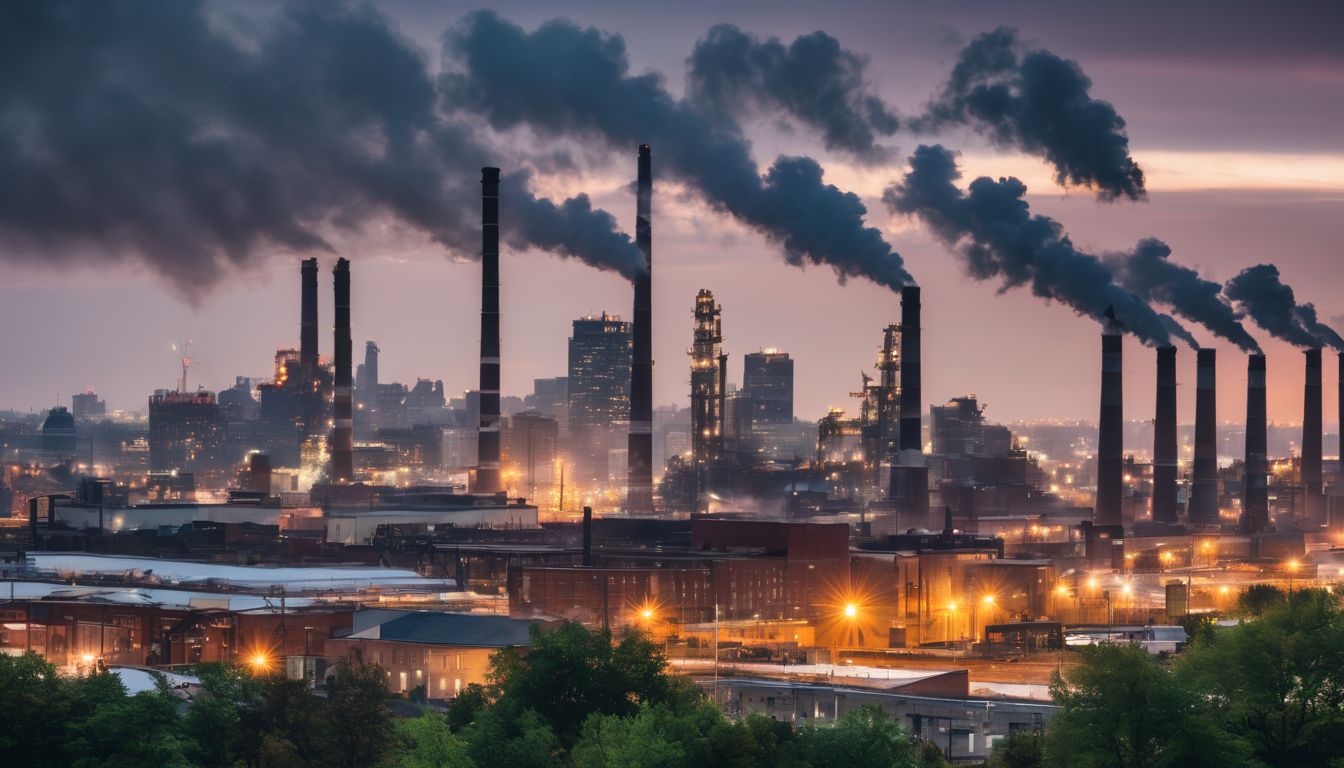As our planet warms up, we all start to wonder what can be done. Corporations are responsible for a significant chunk of global greenhouse gas emissions. This article will explain how businesses are stepping up to tackle climate change and what it means for the future.
Read on – every choice counts!
Key Takeaways
- Companies are taking responsibility for their role in climate change by implementing sustainable practices and investing in renewable energy sources, like solar and wind power.
- Corporations engage with environmental organisations to support conservation efforts and use carbon offset initiatives to balance emissions, showing a commitment to corporate social responsibility.
- Communication plays a vital part in environmental efforts, as transparent reporting on greenhouse gas emissions builds trust and encourages consumer support for responsible businesses.
- The future of corporate accountability involves continuous innovation, partnerships for sustainability, and stronger policies that drive environmentally friendly business operations.
- Individuals have the power to influence companies by choosing products from those who prioritise eco – friendly practices, pushing for transparency in emission tracking, and advocating for green policies.
The Impact of Climate Change on Society and the Planet
Rising temperatures, extreme weather events, changing precipitation patterns and ocean acidification are wreaking havoc on the planet, impacting ecosystems and human societies alike.
These changes have wide-reaching implications for food production, water resources and public health.
Rising temperatures
Earth’s climate is getting hotter year after year, and this uptrend in temperatures spells trouble for both people and the environment. Warmer weather disrupts natural habitats, causes ice caps to melt and sea levels to surge, threatening coastal communities worldwide.
Heatwaves become more frequent and severe, putting vulnerable populations at risk of heat-related illnesses.
Companies play a critical role in addressing these temperature increases as they work towards sustainability. Embracing green initiatives like renewable energy usage can slash carbon emissions significantly.
Environmental stewardship demands bold action from industry leaders who hold the power to steer us towards a cooler future. Every degree matters; corporate climate action has never been more urgent or essential in our collective fight against global warming.
Extreme weather events
With rising temperatures come extreme weather events. Hurricanes, cyclones, floods, and wildfires are becoming more frequent and severe due to climate change. These events can devastate communities, destroy infrastructure, and disrupt supply chains.
Businesses need to adapt by implementing resilient strategies and sustainable practices to mitigate the impact of extreme weather on their operations.
Extreme weather events pose significant challenges for businesses in terms of operational disruptions, financial losses, and reputational damage. Developing robust disaster response plans and investing in climate-resilient infrastructure are crucial steps for companies to ensure continuity and minimise the impact of extreme weather events on both their operations and the communities they serve.
Changing precipitation patterns
As extreme weather events become more frequent and intense, changing precipitation patterns are a significant concern. This includes altered rainfall distribution, leading to both droughts and heavy rainfall in different regions.
Such shifts have far-reaching impacts on agriculture, water supply, and overall ecosystem health. Understanding these changes is critical for individuals and corporations alike to adapt and mitigate their environmental impact.
One example of corporate response to changing precipitation patterns is the development of water-efficient technologies or the implementation of rainwater harvesting systems. Additionally, companies can support natural solutions such as reforestation or wetland restoration projects that help regulate water cycles in affected areas.
Ocean acidification
The increasing levels of carbon dioxide in the atmosphere are not only causing rising temperatures and extreme weather events but are also leading to ocean acidification. As the oceans absorb more carbon dioxide, they become more acidic, affecting marine life such as coral reefs, shellfish, and other sea creatures.
This threatens food security for both marine animals and humans who rely on these resources for sustenance.
Corporate responsibility does not just stop at mitigating greenhouse gas emissions; it extends to preserving the health of our oceans. Companies need to be aware of their impact on ocean acidification and take proactive measures to reduce their carbon footprint, invest in sustainable practices, and support initiatives that aim to protect marine ecosystems from further damage.
Who is Responsible for Climate Change?
Corporations, historical emissions, and individual responsibility all play a role in climate change. To learn more about the impact of corporate responsibility on mitigating climate change, keep reading.
The role of corporations
Corporations play a significant role in climate change as they are major emitters of greenhouse gases. They have the power to influence and drive change by adopting sustainable practices, investing in renewable energy, and reducing their carbon footprint.
Through innovation and responsible business operations, corporations can contribute to climate change mitigation efforts, aligning with environmental responsibility.
By embracing corporate social responsibility (CSR) initiatives such as emissions reduction strategies and green transition plans, companies can help tackle climate change while also benefiting financially.
Historical emissions and culpability
Fossil fuel companies have significantly contributed to historical emissions, which have led to climate change. GHG emissions from these corporations over the years have played a substantial role in driving environmental degradation, impacting communities and natural ecosystems.
It is crucial for companies to acknowledge their historical culpability and take responsibility by implementing emission reduction strategies and investing in natural solutions to climate change.
Understanding the historical context of emissions can help inform corporate accountability and drive meaningful action towards mitigating climate change. By tracking and disclosing their emissions, businesses can demonstrate a commitment to environmental sustainability while addressing their social and environmental impact.
Individual responsibility
Individual responsibility plays a crucial role in addressing climate change. Each person can make a difference by reducing their carbon footprint through actions such as using public transportation, conserving energy at home, and minimising waste.
By taking individual responsibility to reduce personal emissions, people contribute to the collective effort of combating climate change.
Considering the impact of our daily choices on the environment is essential for everyone’s well-being. Engaging in sustainable practices empowers individuals to be part of the solution rather than contributing to the problem.
Corporate Social Responsibility in Climate Change Mitigation
Companies have the opportunity to play a significant role in mitigating climate change through corporate social responsibility initiatives. By implementing sustainable practices, supporting renewable energy, and reducing emissions, businesses can make a positive impact on the planet and society as a whole.
Benefits for companies and society
Fossil fuel companies can benefit from embracing climate pledges and actively reducing emissions. By tracking and disclosing their emissions, companies can enhance their reputation and appeal to environmentally conscious consumers.
This proactive approach not only helps mitigate climate change but also positions these companies as leaders in corporate social responsibility. Moreover, investing in sustainable practices can lead to cost savings, improved efficiency, and long-term resilience for businesses.
Society also benefits from companies taking the initiative on climate change. Successful environmental initiatives contribute to a healthier planet, benefitting communities at large through cleaner air and water, reduced health risks, and protection of natural habitats.
In turn, these positive impacts foster trust between businesses and society while demonstrating a commitment to preserving the environment for future generations – fostering hope for a more sustainable future.
Successful initiatives
- Implementing sustainable supply chain practices to reduce emissions throughout the production process.
- Investing in renewable energy sources such as solar and wind power to decrease reliance on fossil fuels.
- Partnering with environmental organisations to support conservation efforts and promote biodiversity.
- Engaging in community outreach programmes focused on environmental education and awareness.
- Adopting carbon offset initiatives to balance out their carbon footprint and support sustainable projects.
The changing global conversation on CSR
Climate change has brought corporate social responsibility (CSR) into the spotlight globally. Companies are feeling increasing pressure to address environmental concerns and take deliberate steps to reduce their carbon footprint.
This shifting conversation around CSR emphasises the need for transparency, accountability, and tangible action in mitigating climate change impacts. As a result, corporations are reevaluating their business practices and exploring innovative ways to integrate sustainability into their operations while aligning with global efforts to combat climate change.
Furthermore, the changing dialogue on CSR is driving companies towards more robust strategies that prioritise environmental stewardship alongside profitability. The evolving global conversation encourages businesses to adopt environmentally friendly practices, actively track and disclose emissions data, support renewable energy sources, and engage in conservation efforts – all crucial components of an effective corporate response to climate change.
Rethinking Corporate Social Responsibility
With the changing global conversation on CSR, it is important to rethink corporate social responsibility in the context of climate change. This section will explore the evolving definitions of responsibility, CSR, and sustainability, as well as the history of CSR and sustainability.
Importance of communication
Effective communication is a crucial aspect of addressing climate change. Clear, transparent communication from corporations about their emissions and sustainability efforts is essential for building trust and accountability with the public.
By openly discussing challenges and successes, companies can engage stakeholders, including environmentally conscious individuals, in meaningful conversations about how to collectively tackle climate change.
Furthermore, clear communication can also help to raise awareness and inspire action among consumers who care about conservation and environmental protection. It can empower individuals to make informed choices that support sustainable practices and hold businesses accountable for their impact on the environment.
Evolving definitions of responsibility, CSR, and sustainability
As communication becomes more critical in addressing climate change, so too do the evolving definitions of responsibility, CSR, and sustainability. The changing landscape calls for a broader understanding of accountability that encompasses not only environmental impact but also social and economic consequences.
As companies adapt to this shift, the concept of corporate social responsibility (CSR) has broadened to include sustainable business practices that prioritise long-term societal and environmental well-being.
With an increased focus on transparency and ethical business conduct, sustainability is no longer just about reducing carbon emissions; it now concerns how businesses operate at every level.
History of CSR and sustainability
Businesses have recognised the importance of corporate social responsibility (CSR) and sustainability for decades. The concept of CSR evolved from traditional philanthropy in the mid-20th century, drawing attention to a company’s wider impact on society and the environment.
As businesses became more intertwined with global issues like climate change, sustainable development goals gained traction, leading to a redefinition of CSR as a deeper commitment to environmental stewardship and social well-being.
This historical shift reflects growing awareness of the interconnectedness between business success and broader societal welfare, influencing how companies integrate sustainability into their operations.
Final Thoughts and Action Steps
Individuals play a crucial role in holding corporations accountable for their impact on climate change, and it’s important for companies to transparently report and track their emissions.
Looking to the future, corporate responsibility will continue to evolve in addressing climate change. Want to learn more about how businesses can take action? Check out the full blog for valuable insights!
The role of individuals in holding corporations accountable
Individuals play a crucial role in holding corporations accountable for their impact on climate change. By advocating for and supporting companies that prioritise sustainability, environmentally conscious individuals can influence corporate behaviour.
They can also hold corporations accountable through consumer choices, activism, and demanding transparent reporting of emissions. Furthermore, individuals have the power to push for stronger regulations and policies that incentivise companies to reduce their environmental footprint.
Taking action as an individual has a ripple effect on shaping corporate responsibility towards addressing climate change. Whether it’s through personal consumption habits or involvement in community initiatives, each person contributes to the collective effort of holding corporations responsible for their environmental impact.
Importance of transparent reporting and tracking emissions
Transparent reporting and tracking emissions are pivotal for holding corporations accountable for their environmental impact. By openly disclosing their greenhouse gas emissions and monitoring their carbon footprint, companies can demonstrate their commitment to reducing harmful effects on the planet.
This level of transparency allows consumers and stakeholders to make informed decisions based on a company’s environmental performance, thus incentivising businesses to adopt more sustainable practices.
Additionally, transparent reporting fosters trust and credibility, enabling effective collaboration among industry players in collectively addressing climate change challenges.
Tracking and disclosure of emissions play a critical role in driving corporate responsibility towards environmental conservation. This practice ensures that businesses remain committed to minimising their ecological footprint while encouraging others to follow suit.
Looking to the future of corporate responsibility in addressing climate change
The future of corporate responsibility in addressing climate change holds the opportunity for innovative solutions and collaborative efforts. Companies are increasingly recognising the urgency of mitigating their environmental impact, leading to a shift towards sustainable practices and green technologies.
Embracing renewable energy sources, reducing carbon emissions, and integrating eco-friendly initiatives will be pivotal in shaping a more environmentally conscious business landscape while contributing to global conservation efforts.
As corporations continue to adapt their strategies for sustainability and accountability, it is essential for individuals to support these endeavours through informed consumer choices and advocacy for transparent tracking and disclosure of emissions.
By engaging with companies that prioritise sustainability and ethical environmental practices, consumers can further drive positive change on a broader scale.
Conclusion
As individuals, we must hold corporations accountable for their impact on climate change. Transparent reporting and emission tracking are essential for driving meaningful change. Looking ahead, the future of corporate responsibility in addressing climate change depends on proactive steps by businesses and consumers alike.
Together, we can shape a more sustainable future for our planet.
FAQs
1. What does corporate responsibility mean in the context of climate change?
Corporate responsibility regarding climate change involves businesses, including fossil fuel companies, acting to reduce their environmental impact and contribute positively to sustainability efforts.
2. Why should companies worry about their effect on climate change?
Companies need to address their role in climate change because reducing emissions and implementing eco-friendly practices can help protect our planet for future generations.
3. How are fossil fuel companies changing their operations due to climate concerns?
Fossil fuel companies are investing in renewable energy sources, improving efficiency in production, and seeking ways to cut down carbon emissions as part of addressing climate change responsibilities.
4. Can businesses profit from taking action against climate change?
Yes! By innovating with eco-friendly solutions and responding to consumer demands for sustainable products, businesses can seize new market opportunities whilst combatting the business impacts of climate change.





